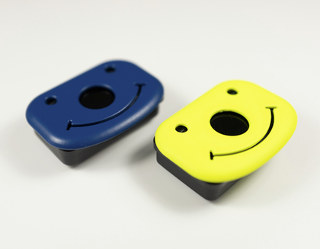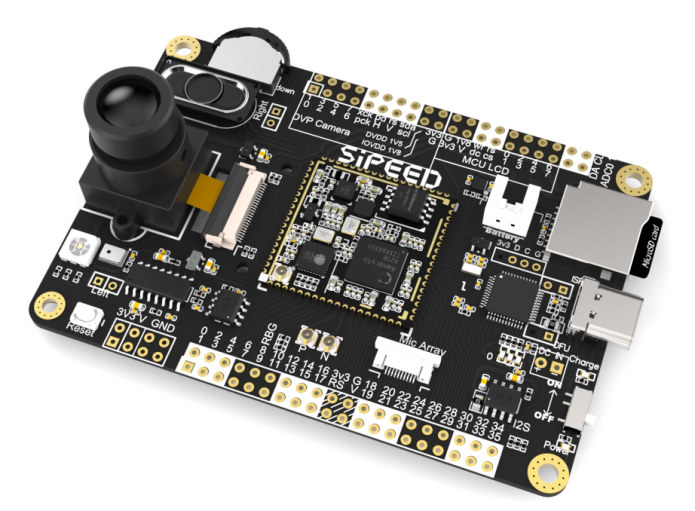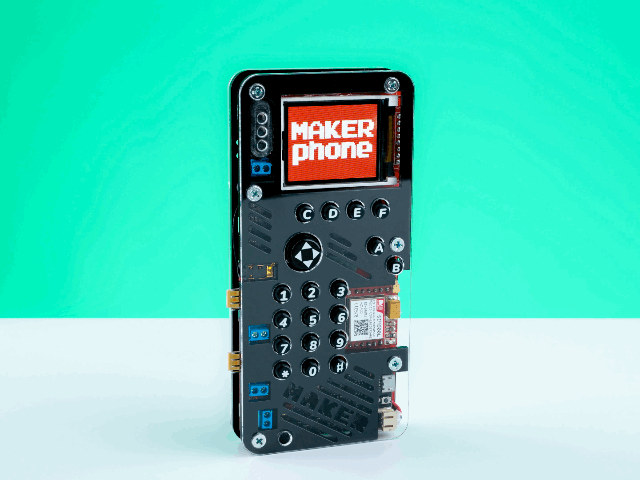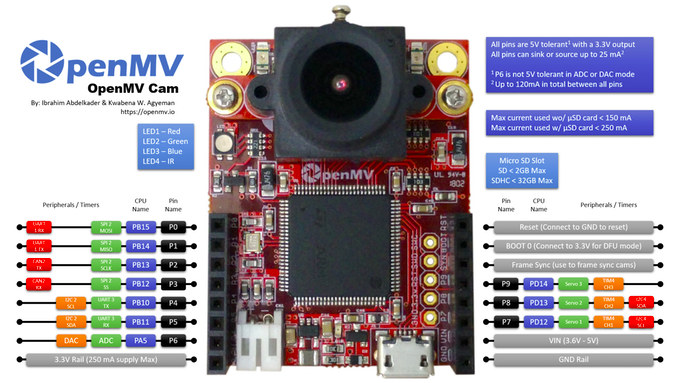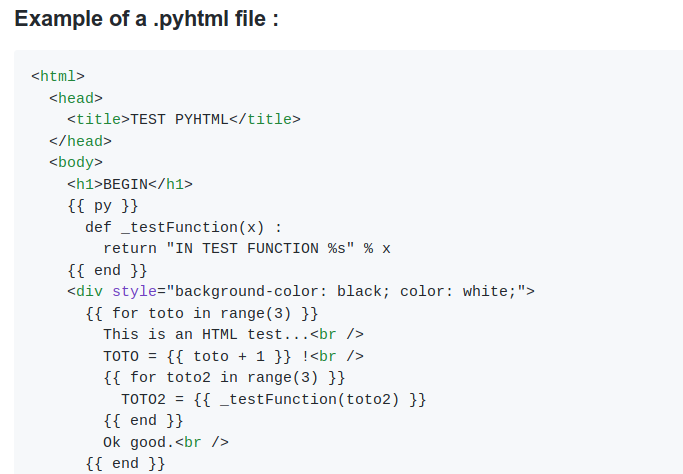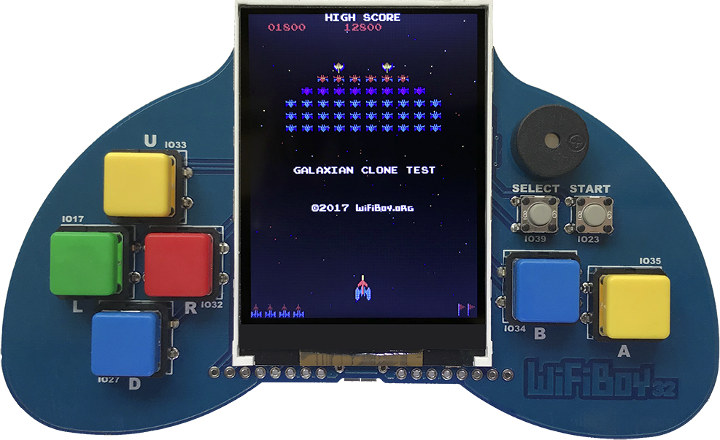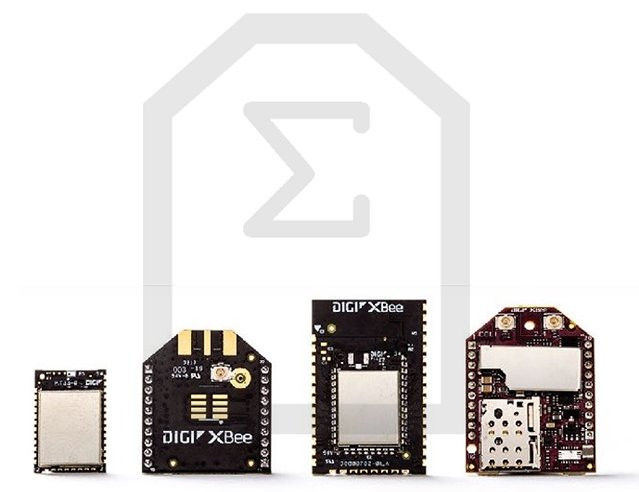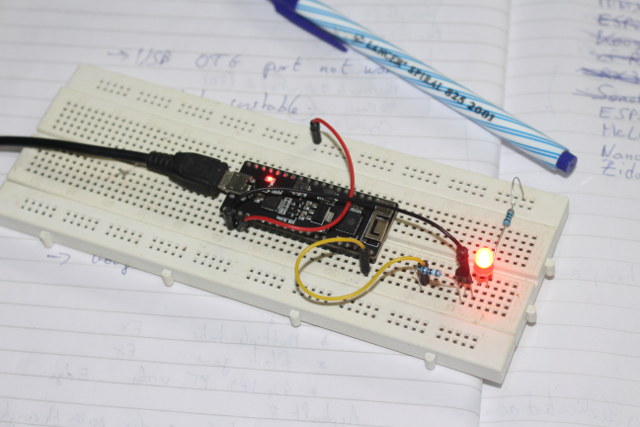Pycom has made some interesting IoT boards running MicroPython in the past starting with WiFi capable WiPy in 2015, and followed by various others supporting various wireless standard including Bluetooth, LoRa, Sigfox, and NB-IoT with LoPy and Fipy. The company launched all their boards via crowdfunding campaigns, and they are now back on Kickstarter for their PyGo plug-n-play wearable devices creating PyMesh networks with up to 12km range between nodes, and managed using Pylife mobile app. Typical use cases include basic connectivity (e.g. messaging) in remote areas without cellular access, and assets / pets / kids location tracking, There are two version of PyGo: PyGo1 with mesh networking only, and PyGo2 that adds cellular network access. Pygo hardware specifications: SoC – Espressif Systems ESP32 dual core WiFi 4 + BLE SoC System Memory – 64 Mbit (8MB) RAM Storage – 8MB flash Display – 128×36 OLED display Connectivity PyMesh up […]
MAIX Development Boards with Sipeed M1 RISC-V AI Module Launched for $5 and Up (Crowdfunding)
Sipeed M1 (aka MAIX-I)is a compact module based on Kendryte K210 dual core RISC-V processor designed for low power artificial intelligence workloads at the edge, such as face detection, object recognition, or audio processing. The module and some development boards are available on Taobao for the Chinese market, as well as YOYCart for the rest of the world, but the company has now launched several MAIX boards based on M1 module through an Indiegogo campaign with price starting at just $5 a piece. Sipeed MAIX Bit (aka MAIX Micro) is the cheapest one at $5 (early bird) / $6 with the following specifications: SoC – Kendryte K210 dual core 64-bit RISC-V processor @ 400 MHz (overclockable up to 800 MHz) with KPU CNN hardware accelerator APU audio hardware accelerator with support for up to 8 mics, up to 192 KHz sample rate FPIOA (Field Programmable IO Array) mapping 255 functions to […]
$94 MAKERphone DIY Mobile Phone Supports MicroPython, Arduino IDE, and Scratch (Crowdfunding)
If you ever wanted to buy a mobile phone that you can assemble yourself, RePhone Kit Ctreate going for $59 is a nice option, but in truth it does not exactly look like your typical phone with its almost square shape. It’s also good to have more option, that’s exactly what MAKERphone is offering with a DIY mobile phone targeting the educational market. Beside the educational value of the assembly also involving some soldering skills depending on the selected kit, kids will be able to learn to program the phone with MicroPython, the Arduino IDE (C language), and/or Scratch visual programming. MAKERphone kit content and specifications: MAKERphone circuit board with 8x user LEDs for backlight (and special effects), 4-way mechanical joystick, 12-button numeric keypad, A, B, C, D, E, and F buttons, DS3231 RTC chip, vibrator… Main microcomputer module based on Espressif Systems ESP32 WiSoC with 802.11 b/g/n WiFi, Bluetooth […]
OpenMV Cam H7 MicroPython Machine Vision Camera Launched on Kickstarter
OpenMV team has launched an upgrade to their popular OpenMV CAM M7 machine vision camera, with OpenMV CAM H7 replacing the STMicro STM32F7 micro-controller by a more powerful STM32H7 MCU clocked at up to 400 MHz. Beside having twice the processing power, the new camera board also features removable camera modules for thermal vision and global shutter support. OpenMV CAM H7 camera board specifications: MCU – STMicro STM32H743VI Arm Cortex M7 microcontroller @ up to 400 MHz with 1MB RAM, 2MB flash. External Storage – micro SD card socket supporting up to 100 Mbps read/write to record videos and store machine vision assets. Camera modules Omnivision OV7725 image sensor (default) capable of taking 640×480 8-bit Grayscale / 16-bit RGB565 images at 60 FPS when the resolution is above 320×240 and 120 FPS when it is below; 2.8mm lens on a standard M12 lens mount Optional Global Shutter camera module to capture […]
MicroWebSrv Lightweight HTTP Web Server Supports HTML/Python Language Templating
There are many languages that can be used to create a web page: HTML, HTML5, JavaScript, PHP, etc… But Python? Apparently yes, as MicroWebSrv lightweight web server – mostly designed for ESP32 platforms running MicroPython such as Pycom boards – supports inserting Python code inside “HTML” files with the extension .pyhtml. The code can be found in Github, and is only comprised of three files. microWebSrv.py – The Web server microWebSocket.py – The optional support of WebSockets microWebTemplate.py – The optional templating language for .pyhtml rendered pages Beside HTML/Python files, the web server can handle GET, POST, … requests, an embedded full REST API, routing handlers, WebSockets, etc… That’s what a mixed HTML + Python .pyhtml file may look like:
|
1 2 3 4 5 6 7 8 9 10 11 12 13 14 15 16 17 18 19 20 21 22 23 24 25 26 27 28 29 30 31 32 33 |
<html> <head> <title>TEST PYHTML</title> </head> <body> <h1>BEGIN</h1> {{ py }} def _testFunction(x) : return "IN TEST FUNCTION %s" % x {{ end }} <div style="background-color: black; color: white;"> {{ for toto in range(3) }} This is an HTML test...<br /> TOTO = {{ toto + 1 }} !<br /> {{ for toto2 in range(3) }} TOTO2 = {{ _testFunction(toto2) }} {{ end }} Ok good.<br /> {{ end }} </div> {{ _testFunction(100) }}<br /> <br /> {{ if 2+5 < 3 }} IN IF (1) {{ elif 10+15 != 25 }} IN ELIF (2) {{ elif 10+15 == 25 }} IN ELIF (3) {{ else }} IN ELSE (4) {{ end }} </body> </html> |
You can use double curly braces {{ and }} to insert MicroPython code, if statements, for loops, or includes. I’m not sure if this makes really sense for all […]
WiFiBoy32 is an ESP32 Portable Game Console and IoT Devkit
I’ve noticed that ever since Hardkernel launched their ODROID-GO “10th anniversary” portable game console based on ESP32 processor, most of the talk on IRC and social media is about this new toy, and people almost seem to have forgotten about the company’s Arm Linux boards 🙂 But recently, I’ve come across a somewhat similar ESP32 device called WiFiBoy32 that acts as both a portable game console and an IoT development kit. WiFIBoy32 specifications: Wireless module – ESP32-WROOM-32 wireless module with 802.11 b/g/n WiFi and Bluetooth 4.2 LE connectivity Display – 2.4″ 240×320 color SPI TFT LCD display Expansion – 2x 8-pin through holes with GPIOs, SPI, DAC, I2S,ADC, VP/VN, and power signals (3.3V, Vin, GND) Misc Top – 6x large gaming buttons, select and start push buttons, buzzer Bottom – PROG and RESET buttons, user LED USB – 1x micro USB port for power and programming (CP2102) Dimensions – 120 […]
Digi Introduces XBee3 IoT Modules with New Micro Form Factor, RF and Cellular IoT Connectivity
Digi International has just announced the Digi XBee3 series of RF modules and cellular IoT modules. The modules will be available in the existing Digi XBee SMT amd through-hole form factor, as well as a new micro form factor (19×13 mm) that’s about a third of the size of the original XBee RF module. The RF modules will first come with ZigBee 3.0 and IEEE 802.15 support, but Bluetooth LE will be available through a firmware update later on, and WiFi and DigiMesh version will be brought to markets too. The first cellular module supports LTE Cat.1, but the company will eventually launch NB-IoT and eMTC (LTE Cat M) versions for Europe and the US respectively. Some of the shared key capabilities listed by the company: Over-the-air (OTA) changes to devices in the field for bug fixes and new features Dynamically reconfigurable, based upon situation Establish business rules to aggregate, store, […]
Getting Started with MicroPython on ESP32 – Hello World, GPIO, and WiFi
I’ve been playing with several ESP32 boards over the months, and tried several firmware images. I started with a tutorial for Arduino Core on ESP32, a few month later I tested ESP32 JavaScript programming with Espruino on ESPino32 board, and recently Espressif Systems sent me ESP32 PICO core development board powered by their ESP32-PICO-D4 SiP, and while I took some pretty photos, I had not used it so far. So I decided to go with yet another firmware, and this time, I played with MicroPython on ESP32, and will report my experience with basic commands, controlling GPIOs, and WiFi in this getting started post. Flashing Micropython Firmware to ESP32 Board Source code is available on Github, as a fork of MicroPython repo as ESP32 support has not been upstreamed yet. We could built the firmware from source, but there’s also a pre-built binary which you can download on MicroPython website. […]


